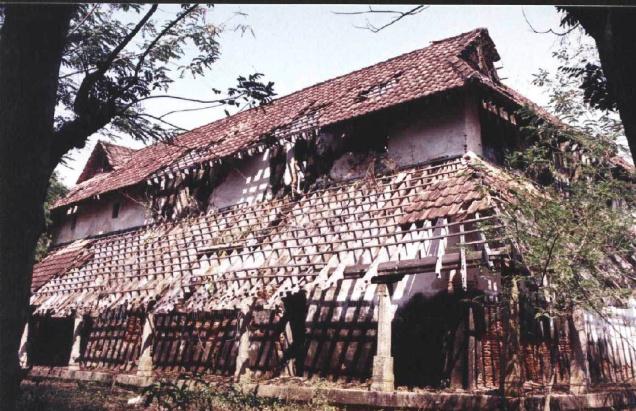
The Eraniel palace, about 20 km from Nagercoil, is regarded as a treasure house of the Venad history but its present state is a pale shadow of its glorious past.
The palace, now under the control of Hindu Religious and Charitable Endowment Department of the State government, has traditional architectural characters from temple architecture of south India. Its notable features are low-tiled roofs, structures with central court yard (nadumuttam) and gable windows. According to sources in the Kerala government’s Archaeology Department, Cheran Perumal, the most famous ruler of the Chera dynasty of the 8th century A.D., was said to have constructed the Eraniel palace and fort over an extent of around 3.5 acres of land.
The palace lost its importance after the Venad dynasty shifted its capital to Padmanabhapuram on completion of the Padmanabhapuram Palace around 1601. Two hundred years later, when Veluthampi Dalawa (Thalavai) was the chieftain of the Travancore kingdom during 1802-1809, it gained prominence again. One of the streets in Eraniel is called ‘Padayetti Theru’ as it was from there that Veluthampi led an army to take on the British. On re-organisation of States in 1956, the Kanyakumari district became part of Tamil Nadu and the Eraniel palace and its fort came under the control of Devasom Board. The palace was used as godown for some years and this hastened its dilapidation.
At the entrance is the visitor’s hall (yogamuri). It was where the then kings met select visitors. Beyond this is the inner hall (agathalam), guard’s room, and kitchen. Next is the royal bedroom (vasantha mandapam) with a granite cot of five-foot width and six-foot length, made of a single stone. The palace was only an administrative office of the then kings but not the residential palace as their royal residence – Pamanabhapuram palace – was hardly five km from Eraniel. There was a ‘vaadavilakku’, an ever burning light, in the vasantha mandapam.
Besides the chambers in the palace, there is a small tank for the royal bath and a secret tunnel for emergency escape. There were 23 tamarind trees on the premises of the palace. Of them, tamarind from one tree was very sweet and it was said to be used for the Kings.
According to former Director of Archaeology (Kerala government), V. Manmadhan Nair, who was closely associated with the conservation of the Eraniel palace for years, when Jagmohan was Union Culture Minister during 2001-2004, a proposal was submitted to him during his visit to the palace. Mr. Jagmohan had assured all kind of help to restore the palace to its past glory. The proposal was based on materials prepared by the Agency for Providing Traditional Solution on the Restoration of Built Heritage at Padmanabhapuram (as suggested by the Indian National Trust for Art and Cultural Heritage).
N. Ramasamy, Kollam-based conservation architect, suggests that the palace, after restoration along with the execution of necessary landscaping (with the help of old photographs) be converted into a museum. He points out that a lot of stone sculptures (in damaged condition), a tank and some antiques such as sword are under the custody of HR &CE Department of the Tamil Nadu government.
At present, the whole area is inaccessible due to thick growth of shrubs and bushes. It has become a haven for anti-social elements.
The government should declare this palace a heritage monument and bring it under the Ministry of Culture, Government of India, says R. S. Lal Mohan, convener of the Nagercoil chapter of INTACH. The HR&CE Department here has sought the government’s financial support for its proposal to renovate the palace at a cost of Rs. 2 crore. A committee, under the chairmanship of the District Collector, has also been proposed to supervise the execution.
Source : The Hindu